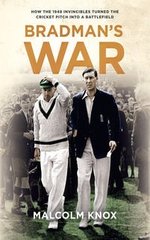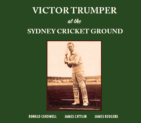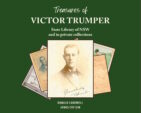Bradman’s War
Archie Mac |Published: 2012
Pages: 434
Author: Knox, Malcolm
Publisher: Penguin-Viking
Rating: 4 stars

The Invincibles tour of 1948, led by Bradman. The first team to go through England undefeated, has perhaps received more coverage than any other cricket tour. Having read my fair share of books about the tour, and the players known as the “greats of 48”, I am envious of those who have not been exposed to the stories.
The reason is those unfamiliar with the details, if they are lucky enough to read Mr Knox’s book, will start with the best. Analytical, detailed and impeccably researched, Knox has produced a book of rare insight into a tour and its captain which has been treated with a reverence and hagiography in relation to that captain by past cricket historians.
The author does not pull punches in his assessment and treatment of the untouchable Sir Donald George Bradman. He alleges Bradman played in an unnecessary win at all costs mentality which was not appreciated by not only the opposition but also by the majority of his own players. Knox believes that as a number of Bradman’s team had recently completed active service in the Second World War their antipathy towards him was due predominately to two things: one, that his own war record was almost nonexistent and secondly, they believed, as did the majority of the Englishman, that cricket was not war.
Malcolm Knox explores the cricket not war theory by commencing the book with a short review of the Services matches played at the end of the war in Europe between Australian and English serviceman. The games had been played in great spirit with winning taking a back seat to camaraderie and entertainment. Hammond, who had been the England captain during the “Victory Tests” found a very different Australian team waiting for him in Australia in 1946-47 under the captaincy of Bradman.
The chapter on the 1946-47 series is a nice preamble into the 1948 summer. Knox thankfully does not spend too much time on the majority of the county matches, spending most of the book dealing with the Tests. He demonstrates surprisingly that the Tests were much closer affairs then the 4-0 final result suggests. The author also explores the Bradman influence on the selection policy and the never to be repeated new ball after 55 overs rule. The latter in particular played into Bradman and Australia’s hands with the Aussies boasting two of the greatest fast bowlers in cricket history in Ray Lindwall and Keith Miller.
Bradman’s use of the fast bowling duo is also called into question in Bradman’s War, with questions of his sportsmanship, especially in the wake of Australia’s perceived whinging after Bodyline.
In the end, it has to be said that most of the criticism of “The Don” in Bradman’s War seems to be mostly hearsay and conjecture. It also appears unlikely that too many of the current generation would think anything other than a win at all costs mentality appropriate when it comes to an Ashes series. Still as Knox points out, despite all the success of the Greats of 48, not too many of the team rated it as their favourite tour. Could this be the influence of Bradman?






Leave a comment